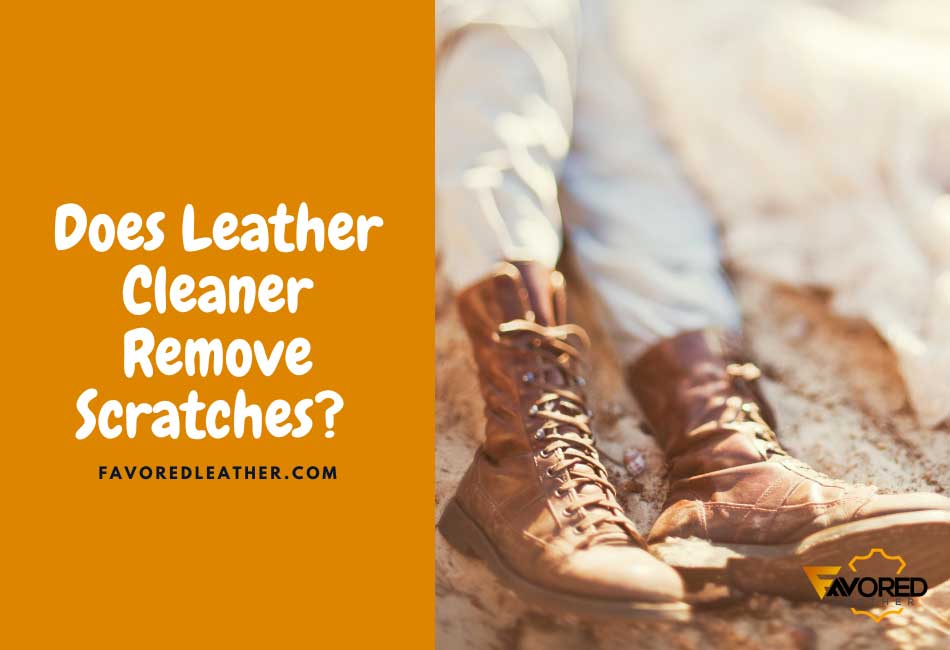Leather is a beautiful and luxurious material, but it can be prone to scratches. In an earlier article, I discussed how leather conditioners could be used to fix minor scratches on leather items. In this article, we will explore whether leather cleaner can remove scratches.
So does leather cleaner remove scratches? Unlike leather conditioners, leather cleaners can not remove scratches on your leather items. Using leather cleaner on severely scratched leather can actually make the problem worse by causing the leather to dry out and become brittle.
So there you have it if you came for a short and sweet answer. However, for more details on what leather cleaner does to scratched leather and how to treat scratches on your leather items, continue reading this article.
How Does Leather Get Scratched?
To be able to understand the effects of using leather cleaner on scratched leather surfaces and how to deal with them effectively, let’s take a look at how leather gets scratched in the first place.
There are a few ways that leather can become scratched. The most common ways are as follows;
- Through Normal Wear And Tear
- Using Abrasive Cleaning Products
- Using Abrasive Scrubbers And Applicators
- Failing To Condition The Leather
Let’s take a look at each of these in turn.
Through Normal Wear And Tear
One of the most common ways that leather becomes scratched is through normal wear and tear. Meaning as you wear or use your leather goods, such as a purse, sofa, or jacket, the friction from use can cause small scratches to form over time.
Using Abrasive Cleaning Products
Another common way that leather becomes scratched is by using an abrasive cleaning product on the surface of the leather.
This could be anything from using a harsh soap to clean a leather handbag to using a solvent-based cleaner on a leather sofa.
These abrasive cleaning products are essentially cleaners that are not meant for use on leather–as they may be too harsh.
Using Abrasive Scrubbers And Applicators
In addition to using abrasive cleaning products, another common way that leather can become scratched is by using an abrasive scrubber or applicator when cleaning, conditioning, or polishing the surface of the leather.
This could be anything from a stiff-bristled brush to a rough cloth. All of these have the tendency to leave scratches on the surface of your leather.
What I always recommend is using a microfiber cloth or a lint-free towel for all of your leather cleaning needs.
Failing To Condition The Leather
One of the most important steps in properly caring for leather is to condition it on a regular basis.
Conditioning leather helps to keep it supple, soft, and prevents it from drying out and becoming brittle–which can lead to cracking and scratching.
However, if you fail to condition your leather goods properly, they can become dry and brittle–and more susceptible to scratches.
What Does Leather Cleaner Do To Scratched Leather?
Now that we’ve looked at how leather can become scratched let’s take a look at what leather cleaner does to scratched leather.
Leather cleaners are meant to clean the surface of your leather goods and remove any dirt, dust, or grime that has built up over time.
However, as we discussed earlier, leather cleaners are not meant to remove scratches.
In fact, using a leather cleaner on scratched leather can actually make the problem worse, and below are some of the negative effects of using a leather cleaner on leather that is already scratched.
1. Leather Cleaner Can Make Scratched Leather Dry Out
One of the main effects of using a leather cleaner on scratched leather is that it can cause the leather to dry out if you’re using the leather cleaner to fix the scratches.
When leather scratches, the grain layer, which is a natural protective layer, becomes compromised.
This exposes the fibrous layers of the leather to potential damage, and one of the ways that this damage can manifest is through drying out.
Drying out occurs when the natural oils and waxes that are in the leather are removed or gradually seep out, leaving the leather dry, brittle, and more susceptible to further damage, such as water damage, staining, and cracking.
Leather cleaners, even those that are labeled as “moisturizing” or “conditioning,” can actually remove these natural oils and waxes from the surface of the leather–exacerbating the problem of drying out.
2. Leather Cleaner Can Make Scratched Leather Cracked
Another common effect of using a leather cleaner on scratched leather is that it can cause the leather to become cracked.
This means a lot more moisture will easily penetrate the surface of the leather, and as a result, the leather will easily develop cracks and peels.
This is because, as we mentioned earlier, when leather becomes scratched, the grain layer is compromised–leaving the fibrous layers underneath exposed and vulnerable to the weather elements, as well as to physical damage.
When leather is left unprotected, it can become dried out, brittle, and cracked.
3. Leather Cleaner Makes Scratched Leather Susceptible To Mold
Another common issue with using leather cleaner on scratched leather is that it can make the leather susceptible to mold.
This is because a lot more moisture will be trapped in the leather, which can eventually lead to a serious mold and mildew problem.
4. Using Leather Cleaner On Scratched Leather Can Cause Fading
Most leather materials are often colored using dyes.
These dyes can be water-based, alcohol-based, or oil-based.
Water-based dyes are the most susceptible to fading when they come into contact with water. Regardless, alcohol and oil-based dyes can also suffer the same fate if care is not taken.
As a result, using a leather cleaner on scratched leather can cause the dyes to leach out–causing the leather to become faded gradually.
How Do You Remove Scratches From Leather?
There are two main ways to treat or remove scratches from leather surfaces: Using a leather or vinyl repair kit or leather conditioner and oils.
Using Leather Conditioners
One of your best bets when it comes to removing scratches from your leather surfaces is using a leather conditioner.
This method works best on light scratches that have not gone through the grain layer.
Leather conditioners help to treat and remove light surface scratches by replenishing the natural oils and waxes that are lost when the leather is scratched.
This helps to make the leather more supple, as well as to protect it from further damage.
Most commercial leather conditioners come in a bottle with a spray top, making it easy for you to apply an even coat over the affected area.
My top picks for the best leather conditioners dealing with scratches are;
- Bickmore Bick
- Fiebing’s Leather Conditioner
- Leather Honey Leather Conditioner
- Chamberlain’s Heavy Duty Leather Cleaner and Conditioner
Using A Repair Kit
For more serious scratches that have gone through the grain layer, you will need to use a leather or vinyl repair kit.
These kits come with a variety of tools and materials that you can use to patch up the damaged area, as well as to recolor it so that it matches the rest of the surface.
Repair kits are more time-consuming and require a bit more effort than simply using a leather conditioner, but they are definitely worth it if you want to remove deeper scratches from your leather surfaces.
My go-to choice for the best leather and vinyl repair kit is the Coconix Vinyl and Leather Repair Kit.
Final Thoughts
In conclusion, it is not recommended that you use a leather cleaner on scratched leather unless you will immediately treat it with a leather conditioner, oil, or balm to fix the scratches.
Doing so can cause a variety of problems, such as making the scratches worse, causing the leather to become cracked, making the leather susceptible to mold, and causing the dyes to leach out and fade.
Your best bet as far as scratches go is to use a leather conditioner or repair kit, depending on the severity of the scratches.
Thanks for reading today’s article, and I hope you found value in it. Cheers until next time!

